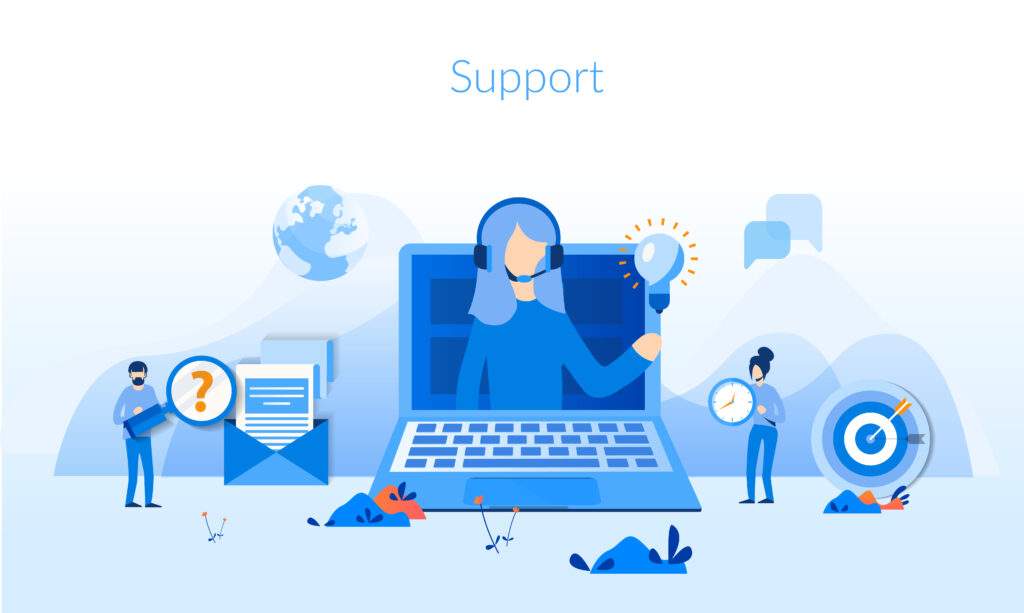You dial the 800 number. You wait.
A pre-recorded message greets you, slowly describing your options. None of them are even close to what you need. You press zero in hopes of an operator.
You’re greeted by another recorded message. All operators are busy. Your wait time is approximately: longer than you planned to spend on the phone.
You wait. Your coffee gets cold. You develop new bad habits (biting fingernails?). Meanwhile, no one at your company can actually do any work because your software isn’t working. The tension mounts.

Suddenly, it hits you: you’re actually paying this company. Their support line is free. But is it?
You’re not alone in your frustration. Seeking tech support is inherently problematic— we usually do it when something has gone wrong, when our business needs help sooner than later. This feeling is so common, Kate Murphy of The New York Times coined a phrase for it: “tech support rage.”
But it doesn’t have to be this frustrating. There are many companies for whom it isn’t this way, and there’s a single factor that determines the difference between outstanding software support and you tearing out tufts of your hair, waiting for a better solution.
The Hidden Factor In ERP Software Support
Smoothly functioning software is critical to your business processes, but bugs are a fact of life. Occasionally, the lines go down. The data center blips.
While your business should expect occasional hiccups, you also have every right to expect responsive, caring customer support.
Caring. Sounds a bit touchy-feely. And it should, because a company that cares has a different, far more effective hands-on model of providing software helpdesk support. It underscores their entire philosophy in their approach to their customers.

That’s important As Vala Afshar notes in a Huffington Post article, 66% of consumers who switched brands did so because of poor service.
Companies that care about rapid response and resolution time have a deeper commitment to the product they’ve sold you. (That is, if your software vendor also provides support; if not, you’re in for a world of hurt.)
How do you find this amazing support? The people who actually care about how well your business software works, and who will do whatever is needed to keep it that way?
ERP Support types (and why they matter)
Before getting into finding diamonds in the rough, it’s important to understand the types of support you typically get when you purchase or license a software product. Not all vendors offer every type of service, but the best ones should check these boxes.
Support material
This could be anything from text-based user documentation, videos, screenshots, or webinars. Support materials like these are intended to be self-service. The more detailed they are, the less likely you’ll need to call support to figure out how to use the full functionality of the product.
Phone support
Imagine a neutral version of the scenario described above. You dial a number and can speak to someone on the phone. For many, it’s reassuring to have a human voice on the end of the line— someone to whom they can explain the issue clearly and feel like they’re being heard.
Live chat

An increasingly popular version of support, live chat allows you to type your issue directly to a virtual operator, often inside software application itself. Companies approach this method differently, with some having an actual person behind the chat, and others providing an AI operator. Some companies now even offer video chat for their customer service needs.
Online ticket submission
With this service, you can submit a ticket directly through an online submission system. The ticket is either assigned to a specific software support advisor, or it goes into a pool until someone grabs it. The best ticketing systems allow you to track response and resolution times; it’s a great objective way to get a sense of how good your support is.
Feature release messages
Either internally generated or pushed out to you via email or phone, these messages are a proactive method of support. If a software product is undergoing an update that will result in more functionality, or a different user experience, knowing that information in advance prevents your employees from being confused when changes occur.
Professional services & consulting
By far the most personal of any support type, a software advisor assigned to your account, who gets to know your business, is someone who you can contact directly. Your advisor may also consult on your business processes that work in line with your software or that may be altered by the way you use it.
How to know your ERP support team cares

While there are plenty of customer support types, with some software vendors offering all of them, that doesn’t mean they’re actually going to help you. Service quality matters far more than the method. And the company that cares will make all the difference.
So how do you find that quality and get the level of service you deserve? Here’s what to look for:
1. Response time
Above anything else, a fast response will indicate a helpdesk support team’s attitude toward helping you. Before you make a commitment to purchase software, contact the customer support channels (note- this is different than contacting sales). Come up with an example issue and see how quickly you can get someone on the phone, or on chat, or on an email reply.
In most companies, a sales representative will get back to you within an instant. And you know why. But support services are working behind the scenes— they’re not interested in doing business with you. However, you can tell very quickly, by the timing of their response, how interested they are in helping you. If a vendor publishes their average response time, check it against your own experience.
2. Resolution time
Just because you have the option to submit online tickets or reach someone via chat doesn’t mean your issue is going to get resolved quickly. Whether it’s a how-to or an actual functionality problem, you need to know that you’ve got someone instantly on the case.
Will your support team provide a hotfix to resolve the issue quickly while they work on a more permanent solution? Are they communicating clearly with you, and is there a way for you to track progress without having to call and inquire? You should have clear, procedural answers to all of these questions.
3. In-House Support
Where is the support based? If the vendor farms support out to a third-party, communication issues can be an unwanted side-effect. Third parties don’t always have the most updated information needed to provide the best quality support.
Software vendors, especially those who actually develop the product, are the best sources of tech support. Why? They know the product better than anyone else. They don’t have a slew of other products they also sell, so they have the advantage of focusing on what they do best. Further, they’re the most invested in the usability of their software and the happiness of their customers. In short, they care the most.
4. Coverage
Vendors that care will be transparent about what types of customer support are covered and what aren’t. It’s commonplace for vendors to charge for premium support packages— with anything, the cheapest option isn’t always the best. Before you pay anything, make sure they publish clear guidelines for what’s free and what isn’t. Hidden costs are the last thing you want to encounter when you need help.
Above all else, you need this…

While the list above details your due diligence in discovering the best software support, all companies that care have this in common: they understand your business.
That means, of course, their support team takes the time to get to know how your business operates. The more intimately they understand your workflows, your employee roles, and your processes, the better (and more quickly) they’ll be able to help.
Having a trusted ERP software advisor is the key to working with support services that care. Because you need someone who will go to bat for you, not just in terms of fixing problems, but in prioritizing your needs. Ideally, your advisor will not only know you, they’ll know your personality and be invested in the livelihood of your business.
There’s a process benefit, too. As Robert Johnson put it in a recent Wired article, “By assigning a single rep to herd the issue through the process, the customer is guaranteed to have support and not have to repeat their question a number of times.”
That type of responsive, caring service is the critical factor in your software experience. It looks a lot different than speaking to an automated operator.
Conclusion
Not all ERP software support is created equally. It’s an iron-clad rule that vendors whose culture emphasizes a caring, personalized approach to support will make sure your business runs smoothly on their product. They can even act as advisors, uncovering solutions to processes you didn’t even know could be better. That kind of insight is priceless.
Before purchasing software, make sure you go beyond what a vendor says about their support. (They’ll all say it’s excellent.) Find out for yourself by taking support channels for test drives. It’s the only way to truly know what kind, and how much help you’re getting with your support.

